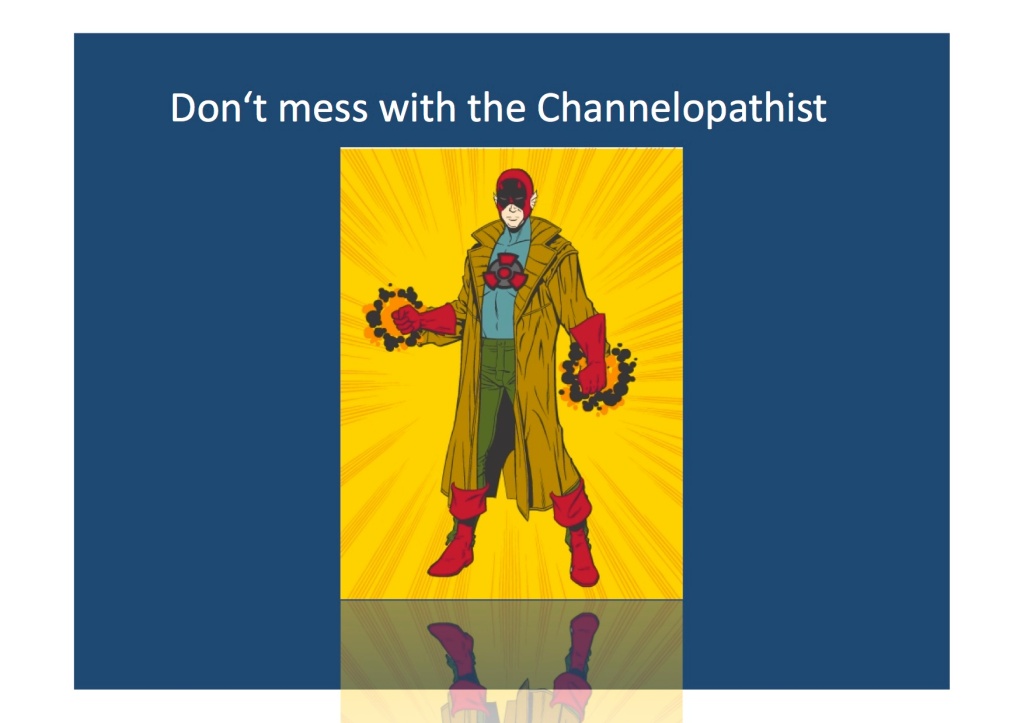Gotham City. Strange sightings have recently occurred in EuroEPINOMICS land. Scientific evildoers and exomic villains tremble in fear. The field respectfully speaks of a masked superhero roaming the floors of major genome centers. His superpowers appear beyond description. Witness the rise of the Channelopathist – and a slightly unusual blog post on epilepsy genetics.
You might be wondering where I am going with this. When we conceived the EuroEPINOMICS blog earlier this year, we discussed two main important issues. The first issue was the question of whether we can actually blog about something as distressing and sad as epilepsy. Epilepsy is a disease in the shadows and we weren’t sure whether we could find a way of communicating news about our consortium in a format that is usually used to discuss the latest haircut of Justin Bieber or the latest mishaps of Lindsay Lohan. Could we blend pop culture and epilepsy genetics? We thought we could. Let there be no mistake, we are aware that epilepsy is nothing to take lightly and nothing to joke about. We are EuroEPINOMICS, a large European research consortium and we have the modest hope to find out something about epilepsy that we can use to help people with epilepsy. We look at genes since this is where we think most of the secrets about epilepsy are hidden. This is a brief post on what keeps us motivated.
What keeps you awake at 2AM? There are vastly different perceptions out there on what motivates scientists. Some scientists seem to be purely driven by higher motives; others appear focused on their career. Again, for some scientists, research is a form of self-actualization. What it comes down to is the fact that we are all different and driven by motives that might be vastly different from person to person. In a previous post and during my talk during YRPE2012, I referred to Deci and Ryan’s Self-Determination Theory that might be particularly relevant for scientists, with its emphasis on competence, autonomy and relatedness. But this framework might sometimes be too narrow; the quest for competence might turn into a goal we can’t achieve. Autonomy may become loneliness and relatedness may turn into a false sense of friendship.

The rise of the Channelopathist. Or did you ever think that the current problems in the field could be solved by anyone else but a superhero?
The Channelopathist. In his book “Who am I”, Steven Reiss discusses the fact that we need to address the very specific belief system of an individual person to get this person motivated. In other words, there is no single recipe. If you regard science as a grave task that comes with the obligation to produce Nature papers with no smiles allowed, you might reach some people. But not many, and particularly Generation Y might be completely lost to you. This is where the Channelopathist comes into play. Science can be fun and needs to take advantage of your specific talents and passions. Science can address all aspects of your personality, and by engaging the various aspects of yourself, you become authentic in what you do. When I was younger, I was really into superheros. This sometimes still reflects on the dramatic language I use in my posts. Why not use this dormant childhood passion for something useful? To remind us that there are still a lot of ion channels out there, but also scientific injustice and complexity that requires the full range of skills of a Marvel-themed superhero. That there is always somebody to call on when your boss is telling you that you don’t work enough, your genome center doesn’t deliver or the reviewers don’t like your paper. Trust me, they don’t want to mess with the Channelopathist. Not ever.
Finally, a name. I mentioned two issues that were important to us from the start. The second issue was a good name for this blog. It was interesting to see that the team, which branded the majority of names for large-scale grant proposals really struggled to come up with a good name. In the end, we had narrowed the selection of candidates down to two finalists. When we had just decided on taking the middle-of-the-road candidate “Beyond the Ion Channel”, my colleague Sarah remarked that she would be very happy to receive her weekly email from the “Channelopathist”, the runner-up in this contest. We therefore selected both entries.



